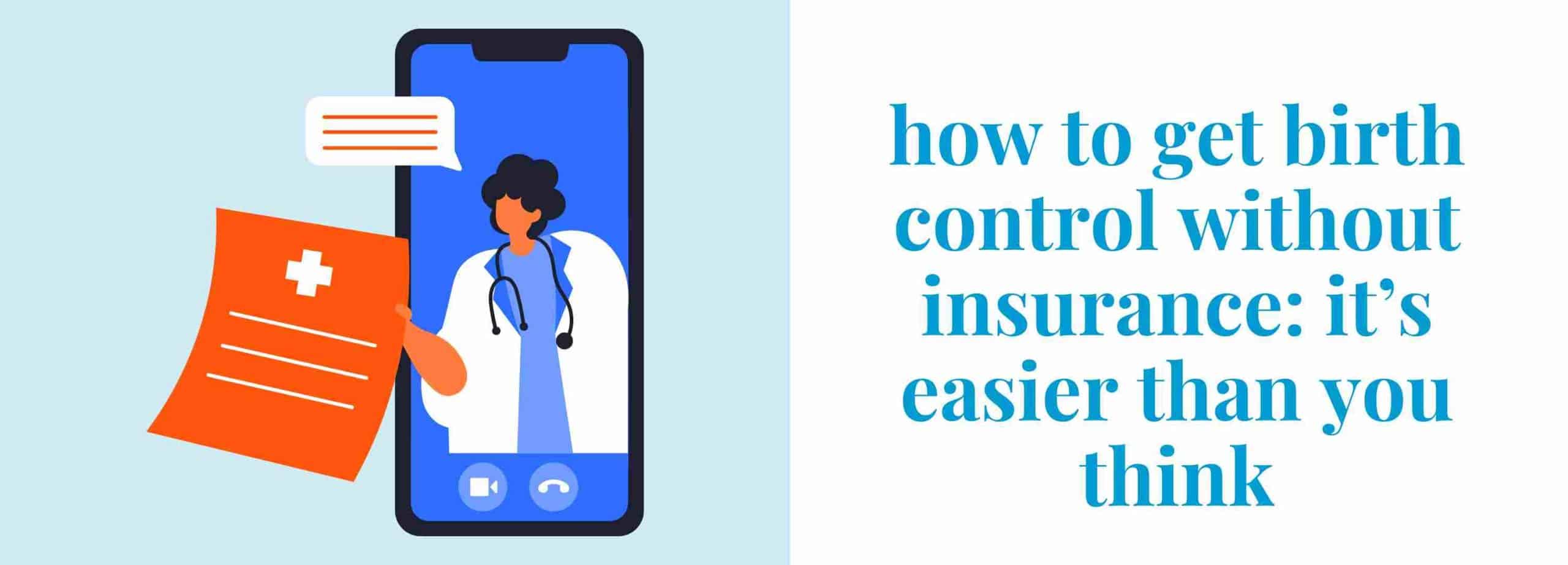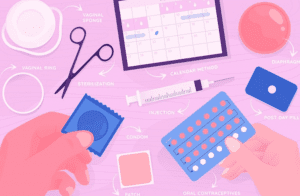Birth control is a common, safe, and easy way to prevent pregnancy, but is it affordable for those who don’t have health insurance?
As a result of Griswold v. Connecticut in 1965, the Supreme Court granted the constitutional right to contraception, and thanks to the Affordable Care Act (ACA) in 2010, most US health insurance plans are required to cover any FDA-approved birth control option for women with no copay, no deductible, making it more affordable for millions of Americans. Furthermore, in July 2022, the U.S. House of Representatives passed the Right to Contraception Act, ensuring access to contraception as a basic human right.
However, the Affordable Care Act mandate doesn’t cover people who don’t have insurance, so the question remains: is birth control expensive for those without coverage?
With a wide range of budget-friendly options available, including the birth control pill, patch, and condoms, birth control can be affordable even without insurance. Pandia Health is here to assist you in determining which affordable options work for you and your budget! /span>

Why Do People Get on Birth Control?
Many people use birth control to prevent unwanted pregnancies. Some forms, such as condoms, can also reduce exposure to sexually transmitted infections (STIs). But hormonal birth control can do so much more!
Hormonal birth control can make your periods more regular, easier to predict, and can reduce cramps and heavy flows, so you feel more comfortable throughout your period. And if you hate your period, you can make your #PeriodsOptional (See Dr. Sophia Yen TEDx talk at the bottom of the link).
Additionally, the combined (estrogen and progestin) hormonal birth control pill can help treat, prevent, or lessen the effects of:
- Hormonal acne
- Ovarian cysts
- Endometrial and ovarian cancers
- Iron deficiency anemia
- Premenstrual dysphoric disorder (PMDD)
- Premenstrual syndrome (PMS)
Depending on your health, lifestyle, whether you want children now or in the future, and your risk of exposure to STIs, you can discuss which form of birth control is right for you with your doctor.
Buy birth control online, in the comfort of your own home
Learn how Pandia Health can prescribe and deliver your birth control online easily to your door, with FREE shipping!
Most Popular Types of Birth Control Available
A doctor will often perform an initial quick physical exam to get blood pressure, height, weight (to check BMI limitations), and consult your medical history, before prescribing birth control. You can also get a birth control prescription through telemedicine, in which case, you can skip the trip to the doctor’s office. Birth control isn’t a one-size-fits-all product! The birth control type that’s best for you will depend on your unique health factors and preferences. What works for you often is related to what worked for your mother, sister, or aunt. What works for your friend, won’t necessarily work for you.
Consequently, the cost of your birth control will vary, depending on what type you choose. Many low-cost birth control options, like selected brands of birth control pills at Pandia Health, may cost as low as $7/pack. Others are more expensive (up to $1,300 for the IUD plus doctor’s fees). Also, the cheapest pill may not be the best pill for you. It may have more breakthrough bleeding or give you more zits and munchies.
Below are just a few of the birth control options available.
Short-acting hormonal contraceptives
These low-cost birth control methods are among the most common and effective ways to prevent pregnancy.
- Birth control pills: Two types of birth control pills are available in the U.S.: The combined oral contraceptive pill and the progestin-only pill “mini-pill.”
- Birth control patch: The birth control patch is just as effective at preventing pregnancy but only needs to be changed once a week, and you can apply the patch yourself; no need for a trip to the doctor’s office (unlike the birth control shot, implant, or IUD). Using a Xulane or Twirla ($50/3 patches) patch is easy: stick a new patch to clean, dry skin once a week.
- Vaginal ring (expensive $175/ring but sometimes $48/ring) : The vaginal ring is a small, flexible silicone ring placed inside the vagina and prevents pregnancy by releasing a continuous dose of hormones. Depending on the brand, the ring can last up to 5 weeks (NuvaRing) or one year (Annovera $2300).
- The shot: The shot, also known as Depo-Provera, is a low-maintenance, highly effective form of longer-term birth control, injected every 12 weeks (meaning you have to go to the doctor every 3 months).
Long-acting hormonal contraceptives
The IUD and implant are excellent alternatives to daily pills, weekly patches, and monthly rings. These are considered LARCs (long-acting reversible contraceptives) and can last at least 3 years without needing to change. However, these might not be a great option if you don’t have insurance and/or you’re looking for low-cost birth control because they can cost up to $1,300 and need a visit to the doctor’s office to have it placed.
There are two types of IUDs, hormonal IUDs (like Mirena, Liletta, Kylena, and Skyla) and copper IUDs (Paraguard). Hormonal IUDs are 99.9% effective in preventing pregnancy, and with them, your period may lighten or cease. Copper IUDs are also 99% effective and work for up to 12 years.
Other contraceptive methods
- Barrier methods: When used correctly and consistently, these methods, like male or female condoms, are effective at preventing STIs and 87% successful at preventing pregnancy.
- Emergency Contraception (EC)/”Morning-After Pill”: The prescription EC is Ella and costs $40 without insurance. The expert doctors at Pandia Health recommend the prescription EC (Ella) over Plan B and its generics because Ella beats Plan B at every time point in preventing pregnancy and works up to a BMI of 35. Plan-B One Step is the brand name option and can cost an average of $40-50 for one pill. Generic versions may cost as little as $11-$45. Remember that you should only take these pills for emergency uses and not as a substitute for hormonal birth control because they do not work as well as the pill, patch, ring, IUD, implant, or shot. Learn more about EC here.
- Abstinence or Outercourse: These methods forgo sexual intimacy or engage in sexual activities that don’t involve vaginal sex.
Birth control costs can vary widely depending on the type you choose, but that doesn’t mean birth control has to be expensive.
How Much Does Birth Control Cost?
Without insurance, birth control pills can still be affordable. Depending on your income, pills can cost between $7-$50 for each pack or $240 to $600 per year for name-brand pills. One pack of patches can cost anywhere from $50-$150. Many states have Title X clinics that have free birth control pills, patches, rings, IUDs, implants, and/or sliding-scale, depending on your income.
Reach out to the experts at Pandia Health if you’re unsure about what birth control pill or method is best for you.
With Pandia Health, you can get affordable, low-cost birth control online and delivered to your door for as little as $7/pack (12-pack minimum, only selected pills).
What is the Cheapest Birth Control?
Thanks to the Affordable Care Act, any FDA-approved method of birth control should be available to those with insurance (with a few exceptions for religious employers such as Jesuit colleges, etc.) for “free” = no copay, no deductible. So if you have insurance, then you would pay nothing for the pill, patch, ring, IUD, implant, or shot.
However, just because you don’t have insurance doesn’t mean you shouldn’t have access to affordable birth control options. Condoms are $1, pills can be $7 to $15 to $20 to $200+ a pack. Condoms are cheaper but fail 13% of the time. Pills fail 7% of the time.
Depending on your needs, medical history, and budget, you may find that a short-acting birth control option is right for you. These tend to be the lowest-cost birth control options because more generic versions are available. This means the brand name, the company that did all the research and development into the drug, no longer holds the patent. This allows other drug companies to make the same medicine and sell it to you for a lower price.
While many insurance plans cover several types of birth control pills, patches, or rings at no out-of-pocket cost, birth control pills remain the most affordable option even without insurance. For example, pills can cost between $0-$50 for each pack, a pack of patches can cost $0-$150, and a vaginal ring will sit around $0-$200.
Find a Birth Control Distributor That’s Right for You
Well, is birth control expensive? The cost of birth control depends on which kind you get, where you get it, and whether you have insurance.
If you qualify for low-income programs, there are many government programs run through your state or local health department that make seeing a provider and getting birth control affordable.
Depending on where you live, Title X Family Planning clinics help people with low incomes get affordable birth control. Your local Planned Parenthood clinic may also provide you with services at a reduced cost.
Pandia Health created the Pandia Health Birth Control Fund, where you can apply for funding to get your birth control pills for free.
Pandia Health also offers telehealth birth control options that work with your schedule, whether or not you have insurance. You’ll have the benefits of getting your birth control online and delivered to your door for free (plus free goodies) through our telehealth approach. With just one $30 payment a year, you get access to our expert doctors (available in these states) for 364 days. So sign up today if you want to change your birth control or get started on the best birth control pill for you.





